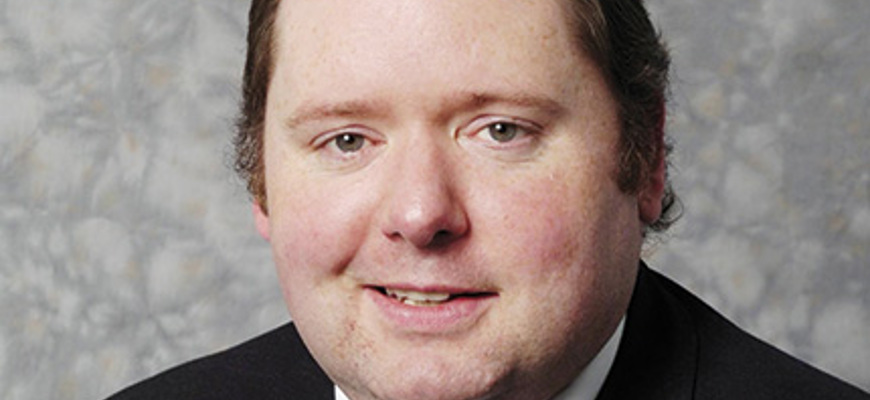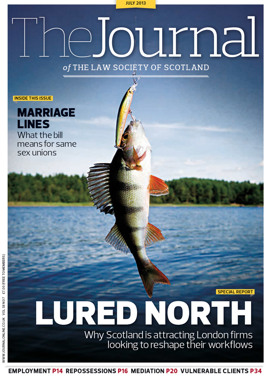Marriage redefined

On the very last day of business before the summer recess, the Scottish Government revealed its much contested Marriage and Civil Partnership (Scotland) Bill 2013. The bill opens the institution of marriage to same sex couples (unfortunately the term “same sex marriage” is used in a number of its headings, which is misleading as there will only be one status of marriage, open to both mixed sex and same sex couples). It is highly likely that the bill will be passed, albeit with amendments, and the Government anticipates that the first marriage of a same sex couple will take place in 2015. This article summarises the main provisions of the bill as introduced.
Opening marriage
The key provision of the bill is found in s 2, which removes the legal impediment to marriage where the parties are of the same sex by repealing s 5(4)(e) of the Marriage (Scotland) Act 1977: as stated above, there is no new institution of “same sex marriage”. Where parties marry in Scotland but are domiciled elsewhere, that marriage will be void ab initio if they would not be entitled to marry by the law of their domicile. Sections 6 and 21 establish jurisdictional rules by amending the Domicile and Matrimonial Proceedings Act 1973. Sections 7 to 9 provide for ways to convert a civil partnership into a marriage: there appears to be no time limit on the availability of this facility.
Several other sections make consequential amendments to devolved legislation to remove gendered language. Section 1 removes gendered phrases from the forbidden degrees of marriage, while s 3 makes similar amendments in relation to terms such as “widow”. Section 4 provides for the interpretation of the word “marriage” (and related terms such as divorce) in legislation to include marriages where the parties are of the same sex, except where the provision makes clear that there is to be a distinction, including, for example the separate provisions within the bill itself in relation to religious celebrants (see below).
All references in legislation to “living together as if civil partners” are repealed, as unmarried same sex couples who are not in a civil partnership will be subject to the “living together as if husband and wife” test. Words such as “marriage” and “husband” in wills and other documents shall, from the coming into force of s 4, include married same sex couples unless the contrary intention is clear.
Although there is to be only one status of marriage, the regulation of “religious or belief body” celebrants is different as between marriages of mixed sex and of same sex couples. Sections 10 and 11 of the bill provide that a slightly amended form of the current provisions in ss 8 and 9 of the 1977 Act, dealing with religious persons who may solemnise marriage, will apply only to marriages of mixed sex couples. The same sections introduce new ss 8(1B), 8(1C), 8(1D) and 9(1A), which will regulate religious solemnisation of the marriages of same sex couples. The same set of religious celebrants may solemnise a marriage of a same sex couple as may solemnise a marriage of a mixed sex couple, provided the religious or faith body has requested that it be prescribed by the Scottish ministers for that purpose. No religious or faith body can be required to seek prescription, and no individual approved celebrant is under a duty to perform marriages of same sex couples even where their religious or belief body has secured such powers.
For the avoidance of doubt, s 14 provides that nothing in the bill so far as it makes provision for the marriage of persons of the same sex, and the persons who may solemnise such marriages, shall affect the exercise of the European Convention on Human Rights’ guarantees of freedom of thought, conscience and religion (article 9) or of freedom of expression (article 10). Finally, the provision that allows for recognition of foreign marriages of same sex couples as civil partnerships in Scotland is amended, as such marriages will henceforth be recognised as marriages.
Religious civil partnerships
Despite calls from some quarters to allow for mixed sex civil partnerships, such a move is not contained in the bill, though the Government has indicated that it will review the issue for the future. What the bill does do is allow for the possibility of a civil partnership celebrated by an “approved celebrant” (s 22). The provisions relating to such celebrants mirror those described above in relation to religious or belief group celebrants of marriage, and while there are such groups who would like to conduct marriage, it is perhaps a retrograde step to take what was a modern, secular process and intrude the complexity of non-state actors, especially where there is little evidence of demand. (It may also be noted that s 25 establishes the validity of the dissolution of civil partnerships which were granted without third party evidence under the simplified procedure before 30 March 2012.)
Other measures
The position of marriages conducted by humanist celebrants (currently, somewhat oddly, a form of religious marriage) is regularised by the introduction of marriage by a “religious or belief body”, meaning an organised group of people which meets regularly (1) for religious worship or (2) to uphold or promote philosophical beliefs (s 10). By s 26 the common law offence of bigamy is abolished and replaced by two statutory offences of purporting to enter a marriage or civil partnership knowing that either or both parties are already married or in a civil partnership.
One aspect of the Gender Recognition Act 2004 which has proved particularly problematic for applicants has been the requirement that, in order to be legally recognised in their appropriate gender, a person has to divorce whether the couple wish that or not. As a consequence of opening marriage to same sex couples, that requirement will be removed (s 27).
The length of time which must pass between submitting all necessary paperwork to the registrar and the issuing of a schedule for marriage or civil partnership will be increased from the present 14 days to 28 by s 16 of the bill, with provision for allowing a shorter period in the event of, for example terminal illness. Section 19 replaces “approved places” (i.e. places other than a registry office where civil marriages may take place) with any (non-religious) “appropriate place”, to be agreed between the parties and the local registration authority.
Disappointingly, s 5 of the bill contains the explicit continuation of three aspects of marriage law which, it is submitted, might have been abolished. The rule that a wife cannot be guilty of reset in relation to stolen goods in the possession of her husband continues, but will not apply where the wife is married to another woman. The rule that a marriage is voidable for incurable impotency continues, but the definition of impotency will not be changed, so restricting the rule to marriages between mixed-sex couples only. Finally, availability of divorce based on adultery continues; this will apply to any marriage, but the definition of adultery remains sexual intercourse, so that the adulterous behaviour must be heterosexual regardless of whether the marriage is of a mixed sex or same sex couple.
In this issue
- Credit hire: back to basics
- You know who I mean
- Behind all the fun
- Your Future in Law
- Reading for pleasure
- Opinion column: Cameron Fyfe
- Book reviews
- Profile
- President's column
- Mapping out the Crofting Register
- Back office bait
- Another bite at the cherry
- Security of your home
- Marriage redefined
- Building better business cultures
- Keeping a rein on child cases
- Minimum gain
- Beware LLP tax changes
- Framework remodelled
- Scottish Solicitors' Discipline Tribunal
- A Scottish ILG chair in New York
- Beneath the surface
- Being alert to the needs of the vulnerable
- Sins of our leaders
- How not to win business: a guide for professionals
- Litigation: a tight ship?
- Ask Ash
- Why sep rep?
- From the Brussels office
- Law reform roundup
- Diary of an innocent in-houser






